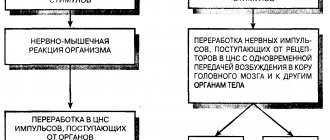Author of the article: Naumenko Alexandra Igorevna Family psychologist, child psychologist. Practical work experience: 8 years.
Do you remember what it was like when you were a child? Emotions and feelings were turned on to the fullest, joy seemed off scale, grief seemed inconsolable. There were so many important things in life: the weather, a bicycle, a best friend, lizards in the grass, apples on a tree. Most people lived life most fully in childhood, felt emotions, and enjoyed every day.
Now let's look at the present moment. Apathy, fatigue, lack of sleep - unfortunately, these are constant companions of modern man. So the answer to the question of why a person stops experiencing emotions is stress. It can be either chronic, that is, accumulated, or eventful, one-time, when some large-scale shock occurs in a person’s life (death of a loved one, loss of a job, illness, etc.). But what to do if you don’t feel any emotions, now we’ll try to figure it out.
general characteristics
During the period of apathetic mood, indifference to all external events develops, emotions become weakly expressed or absent altogether, interest and the desire for action decrease.
In men, this condition manifests itself more clearly and occurs more often: they spend a significant part of their time at home, do not go out to work, and refuse friendly meetings, usual hobbies, and sports. In women, apathy develops less frequently due to their natural emotionality and greater involvement in social interactions - caring for children, communicating with friends, meeting with parents. The basic psychological mechanism for the development of apathy is the depletion of mental energy reserves (emotions, motivations, involvement). In healthy people, indifference and indifference are the result of prolonged stimulation of the central nervous system. The brain begins to induce inhibition processes, protecting the body from further waste of energy and excess nervous tension. Sometimes apathy, arising as a defensive reaction, is consolidated as part of the personality, and then subconsciously used at certain periods of life.
The key manifestations of an apathetic state are the lack of expressed emotions, interest in current events and people around. As a result of these changes, there is a refusal to work, household duties, and a narrowing of the circle of friends. In men, apathy is accompanied by a reluctance to perform hygiene procedures, get out of bed, and eat. In women, emotional devastation is more noticeable - loss of interest in communication and hobbies, inability to be happy, sad, or angry. Apathetic people are often absent-minded, inattentive, and cannot cope with their usual tasks: they cannot choose clothes, make a shopping list, or prepare dinner.
Other characteristic symptoms, equally common in both men and women, are general weakness, slow reactions, feelings of loneliness, memory impairment. It is worth distinguishing laziness and depression from apathy, since these conditions are symptomatically very similar. Laziness is selective - you don’t want to do certain actions that don’t bring you pleasure. At the same time, a person can easily start doing what he likes - go for a walk, meet friends. Apathetic states cause paralysis of any activity, a complete lack of desires.
Depression is characterized by a decrease in mood, a predominance of negative emotions - sadness, sadness, disappointment, depression. When apathy develops, positive and negative emotions are smoothed out and are practically absent. Anxious depression occurs with motor restlessness, an apathetic state is always accompanied by slowness of movements. Sometimes it becomes a manifestation of severe depression: patients are indifferent to current events, sit or lie for a long time without moving, without talking.
Signs of a lack of emotion
To understand how to start feeling emotions again, you first need to realize that you don't feel them. It sounds funny, of course, but in reality many people get so used to living in a gray world without any feelings that they don’t remember what it’s like to be happy, sad, angry, surprised and afraid. Not only positive emotions disappear, but also negative ones, which, however, are also important for the full functioning of our nervous system.
So, you have stopped feeling emotions if:
- life does not bring you joy, every day is boring for you;
- you perform all actions automatically;
- you don’t understand what you want, you don’t know what could bring you pleasure;
- you suppress your dissatisfaction with life with bad habits (overeating, alcohol, cigarettes, etc.);
- It’s hard for you to get rid of obsessive thoughts and states.
All of the above indicates that you have disabled the perception of your own feelings. You are in a low energy state, perhaps even depressed. Fortunately, this is not a death sentence. It is normal to not feel emotions and feelings after stress and during chronic, prolonged stress. But you need to get out of this state as soon as possible.
Causes of apathy
Emotional exhaustion develops as a result of stress, traumatic situations, and previous somatic diseases. In addition, it is a symptom of mental disorders and organic lesions of the nervous system. Apathy can be a temporary condition, a manifestation of another pathology, or a side effect of taking medications. In men, it often develops due to the use of alcohol and drugs. It arises as an independent disorder, in combination with lack of will it represents apathetic-abulsic syndrome, and in the absence of motor activity - adynamic syndrome.
Psychological reasons
In men and women, mild apathy can be a character trait combined with low social activity, slowness, and phlegmatism. The causes of apathy as a state of maladjustment are situations that deplete motivational and emotional resources. Personal qualities or external events for which a person was not prepared are considered as provoking psychological factors. Common causes of apathy:
- Unattainable goals.
People with a high level of demands on themselves tend to set high goals and make every effort to achieve them. The reasons for apathy in such cases are extremely difficult, overwhelming tasks that reduce faith in success and generate dissatisfaction with oneself. - Lack of purpose.
A state of emotional emptiness and lack of initiative arises in situations where previous goals have been achieved, but new ones have not been formed. Strength is wasted, needs are satisfied, the person is apathetic for some time. Examples of such situations: a student after passing a session, an entrepreneur who has achieved high profits. - Lack of independence.
This personality trait is manifested by a passive-defensive strategy of behavior. The causes of apathy are shifting responsibility to other people, a wait-and-see attitude, fear of failure, and lack of independence. - Stress.
Sometimes situations of high emotional stress provoke the development of a defensive reaction - apathy. The psyche involuntarily goes into energy saving mode: the patient stops defending his position, loses interest in activities, and becomes indifferent and indifferent. - Frustration.
This term refers to a condition that occurs when it is impossible to satisfy an urgent and strong need. In women, typical causes of apathy are an unsuccessful marriage, fear of divorce; for men - doing unloved work, lack of prospects for other income. - The monotony of life.
A common cause of apathy in women is a lack of new impressions, an established routine with a lack of interesting activities. Most daily activities are done automatically, events are predictable, and there is no time left for hobbies, creativity and research. - Emotional shock.
Apathy as a defensive reaction of the psyche is formed in response to intense positive or negative experiences. In women it is triggered by the birth of a child, in men the main reasons are the loss of their previous social status, dismissal from a high position, refusal to hire.
Mental illness
Possible causes of pathological apathy are mental disorders. In patients, signs of apathy are pronounced, reduce social activity, and interfere with the implementation of household chores and hygiene procedures. Often such people need daily outside care, organizing and stimulating help from relatives. The most common mental illnesses that occur with apathy include:
- Depression.
The main signs of a depressive disorder are low mood, loss of the ability to experience pleasure, and a feeling of meaninglessness in what is happening. There is apathetic depression - a state of indifference, indifference. It develops more often in women and is provoked by prolonged stress. - Schizoid personality disorder.
Schizoid psychopathy is a pathological change in character, manifested by isolation, stinginess of emotional experiences, a tendency to theorize and philosophical reflection. It is more often determined in men. Such people may seem apathetic in social interactions, but often have unique hobbies. - Schizophrenia.
This endogenous mental disorder is characterized by the disintegration of thinking processes, flattening, and impoverishment of emotional reactions. The longer and more severe the disease progresses, the more pronounced the emotional coldness and indifference becomes. More often, apathetic states are observed as a manifestation of sluggish schizophrenia with a gradual continuous deterioration of the patient’s condition. - Hospitalism.
When a patient stays in hospital for a long time and lacks communication with loved ones, a mental disorder develops – hospitalism. It is more pronounced in women, children, and the elderly. Manifested by weight loss, lethargy, apathy, drowsiness, and isolation.
Neurological diseases
Apathy can be a symptom of neurological diseases - dementia, brain tumors, strokes, neuroinfections, traumatic brain injuries. It manifests itself on the basis of organic brain damage (vascular, neurodegenerative, traumatic). It is especially characteristic of pathologies accompanied by damage to the frontal lobe, anterior cerebral artery, pituitary gland or limbic structures. Common neurological causes of apathy:
- Infections.
Apathetic symptoms appear during neuroinfections, when pathogens spread in nervous tissues, as well as during general severe infections with secondary involvement of the nervous system in the pathological process. Thus, meningitis is characterized by fever followed by apathetic states and severe anxiety. For HIV infection - a gradual increase in apathy and depression. - Dementia.
The cause of apathy in dementia patients is changes in the white matter of the brain that occur due to age-related degradation of small blood vessels. 82% of elderly women and men with lesions of the frontal lobes show signs of apathy: dulling of emotions, decreased motivation and initiative. The risk group includes patients with Alzheimer's disease, Pick's disease, vascular and mixed dementia. - Long-term consequences of TBI.
Mental disorders often occur in the long-term period of traumatic brain injury. Apathy is diagnosed in persons with astheno-neurotic syndrome, in whom the consequences of injury are represented by high fatigue, reduced performance, and memory disorders. - Brain tumors.
Indifference and indifference are observed in cases where the tumor is localized in the frontal lobes or pituitary gland. Signs of emotional disturbance appear already in the initial stages of tumor development; in addition to apathy, they may include depression, infantility, tearfulness, and irritability.
Taking medications and alcohol
Long-term use of some drugs leads to the development of side effects accompanied by apathy. The risk is highest when taking tranquilizers, antidepressants, sleeping pills, oral contraceptives, and antibiotics. Another possible cause of apathy is withdrawal syndrome (alcohol hangover). In both cases, emotional disturbances are caused by biochemical changes in central nervous system processes in the parts of the brain responsible for emotions. Apathy occurs within the following syndromes:
- Neuroleptic syndrome.
Long-term use of antipsychotics can cause affective disorders, decreased cognitive functions, and social activity. Mental retardation, akinesia, and asthenia develop. Neuroleptic deficiency more often affects men and women with bipolar affective disorder, schizophrenia, and endogenous depression. - SSRI-induced syndrome.
This complication is a consequence of long-term treatment with antidepressants of the selective serotonin reuptake inhibitor group. It manifests itself as dulling of emotions, reduced emotional sensitivity, and a feeling of “emotional anesthesia.” Apathetic syndrome is found in patients with panic disorder, generalized anxiety disorder, depression, and obsessive-compulsive neurosis. - Side effect of sleeping pills.
Sleeping pills have a depressing effect on the synaptic transmission of signals in the central nervous system, so the person feels drowsy and falls asleep. They distort the natural sleep formula and suppress the rapid phase. After awakening, a feeling of fatigue arises, performance decreases, emotional detachment and indifference are formed. - Withdrawal syndrome.
The reason for the apathy of men who abuse alcohol is a state of withdrawal (hangover). At the first stage of alcoholism, when taking a break from drinking alcohol, a feeling of weakness and drowsiness appears, and apathy or irritable aggressiveness increases. At the second stage, autonomic disorders become more pronounced - headaches, changes in blood pressure, increased sweating.
How to get your emotions back
So what to do if you stop feeling emotions? First you need to understand exactly what method of turning off emotions your psyche has chosen. The fact is that the human psyche is a complex and wise structure, therefore, if there is an excess of negative feelings, it can turn off unpleasant (and along with them pleasant) sensations in different ways, so that overload does not occur, and you can somehow function and survive, albeit bleakly.
There are two most common scenarios in which you stop feeling emotions:
1. Emotional burnout. This phrase is already familiar to many and means that for a long time your nervous system has been overloaded. Yes, yes, these are the consequences of that same chronic stress that slowly but surely leads to sluggish depression. “I don’t feel emotions,” says a person who is too tired of living and doing things. In this state, you usually have to do everything through “I can’t”, because with your mind you still understand why you need to go to work, play sports, meet with friends and improve in any activity, but your strength is becoming less and less.
2. State of affect after severe stress. Sometimes life can be cruel, none of us are ready for the loss of a loved one, bankruptcy, or the loss of something important. When something like this happens, the psyche urgently cuts off the ability to feel emotions and goes into energy-saving mode. In such cases, if the personality is not too hardened by difficulties, the person may not see the meaning of his existence. And if, with emotional burnout, you can float through life without desire, but still perform the necessary minimum of actions for survival, then here we can already talk about severe clinical depression. A person begins to lie in bed all day long, or play computer games, or even spend all his days drinking a bottle, not caring at all about his food, his health, or his loved ones.
Survey
To find out the causes of apathy, you need to consult a psychiatrist and neurologist. The examination begins with a clinical interview of the patient: the duration and severity of apathy and provoking factors are determined. With severe apathy, patients remain indifferent, do not answer the doctor’s questions on their own, and the conversation is held with relatives. During the observation, the absence of external manifestations of emotions, slowness, and weakening of motivation come to the fore. To more accurately determine the cause of apathy, the following methods are shown:
- Psychodiagnostic testing.
The use of psychodiagnostic techniques makes it possible to diagnose apathy as a symptom of mental illness or a state of psychological maladjustment. A set of tests for men and women is selected individually by a psychologist. Various self-esteem tests are used, for example, the Beck Depression Inventory, and complex personality questionnaires - the Cattell questionnaire, SMIL, Eysenck questionnaire. If schizophrenia or dementia is suspected, a pathopsychological study of cognitive functions (thinking, intelligence, memory) is carried out. - Neurological examination.
Apathetic patients with symptoms of nervous system damage are examined by a neurologist. Using a survey and special tests, the neurological status is assessed, the nature of the central nervous system lesion (focal, diffuse), the localization of the lesion is determined, and the main pathophysiological mechanism is established. Data from a neurological examination allow the doctor to suggest the causes of apathy and select instrumental procedures to clarify the diagnosis. - Instrumental research of the brain.
To assess the nature of brain damage and determine the localization of the lesion, imaging methods are used: MRI of the brain and supplying vessels, ultrasound of the vessels of the head and brain structures, CT of the brain. Apathy often accompanies damage to the prefrontal zones, pituitary gland, and limbic system.
Loss of awareness of vital feelings
Loss of awareness of vital feelings affects the so-called lower emotions that accompany acts of elementary sensitivity and actual physiological needs (there is another, not entirely accurate name: the syndrome of alienation of vital feelings). Patients complain of unpleasant experiences of dullness and loss of sensations of various modalities, especially often skin sensitivity: “numbness of the cheek... the skin on the head does not feel anything... lips feel like wood... vision has dropped sharply, I have to strain to see... it feels like I won’t hear enough , I perceive sounds indistinctly, they seem to merge”, etc. Often patients report that they do not feel the need for sleep, that their drowsiness and urge to sleep have disappeared, so that they fall into a state of sleep from wakefulness very quickly, bypassing drowsy state. In the same way, they wake up unusually quickly - “as if on alarm.” These same patients often add that they cannot understand whether they are sleeping or not, or they claim that they do not sleep at all, that they do not experience a feeling of rest after sleep.
Some patients report that they do not feel as tired as before, even after hard physical or mental work, nor do they feel the pleasant feeling of muscle fatigue. Quite often there are complaints from depressed patients about a loss of feeling of cheerfulness, a feeling of constant powerlessness, and decreased physical strength. Sometimes they compare their condition with “decrepation”, “aging”, “senile infirmity”.
| | Such manifestations indicate the presence of a mental illness. If you experience symptoms of loss of awareness of vital feelings, we recommend that you consult a psychiatrist |
Thus, a young woman says that she feels “10 years” older. Another reports a depressing feeling that she has “grown very old.” “It seems to me,” she continues, “that I’ve been around for many years, probably over 70, and I’ve outlived my time.” The third says: “If I am in my normal state of elation, I feel young, much younger than my years. When I feel bad, it seems to me that I am fading away, growing old and I am about 80 years old, I am so weak. I have no strength, I hardly do anything around the house. I quit my job twice because of this powerlessness and sat at home crying.” She said that at the first conversation the doctor seemed to her “elderly, in years.” At the follow-up conversation, on the contrary, he was young.
“I even decided that there were two different doctors, I asked the women in the ward about this.” Another patient complains of “the feeling that I have lived for a long, long time, that I was young once so long ago that I seem to have forgotten about it.” A patient with depression reports: “I have such a hopeless feeling, as if inside I have become completely gray, I feel like a deep and rotten ramolik.” The second says: “Nothing interests me. It’s as if I’ve lived my whole life, seen everything, heard everything, nothing can surprise me anymore. And I no longer care what was, what is and what will be.” The third patient says: “I feel like an old man. There is no fun, constant lethargy, I don’t need anything, the joys of life are no longer for me, it seems it’s time for me to die.” Complaints of such patients about impotence can easily be mistaken for a manifestation of severe and persistent asthenia. We note that sometimes they are clearly mixed with a feeling of imaginary aging and impaired perception of time.
Sometimes it is possible to establish that patients lose the feeling of malaise during a somatic illness, the ability to feel a rise in temperature even to high levels: “I am sick differently than before. It used to be like this: if you get sick, you feel unwell, lethargic, in a bad mood, you feel hot. And when it passes, you are satisfied and rejoice. And now I know that I have a fever, but I don’t feel sick... The thermometer shows a high temperature, but I don’t feel either heat or chills, I’ve stopped understanding whether I’m sick or not.”
The feeling of pain is often lost, which is something that patients usually don’t particularly care about: “I used to feel the pain acutely and was very afraid when they pricked my finger for a blood test. And now they give me injections every day, even into a vein, and I almost don’t feel that I’m in pain... I don’t notice that I’m in pain. I cut my hand, it bleeds, but I don’t feel any pain... The pain has become somewhat dull, it is felt somewhere far away... I used to be terrified of injections, but now, when they inject me, I’m not. I feel like they are piercing the skin, but it doesn’t hurt.” Some patients notice that they do not feel heat or cold.
For example, in cold weather they go without a hat or gloves, in the steam room they lose their sense of proportion, overheat, and even get burns. The patient says that he no longer clearly senses temperature changes: “I used to go from cold to warm and felt that I was warming up. But now there is no such thing.” Some patients report that when they are depressed, they no longer feel an increase in blood pressure. Very often there are complaints about dulling of various types of sensitivity, sometimes simultaneously with deceptions of perception: “I feel like I smell like carrion, the smell comes from somewhere inside. But I don’t smell any real smells. Perfume is like water to me... My tastes have dulled... When I walk, it’s like I’m stepping on a cotton pillow... The sounds are indistinct, my body feels like it’s dying, I feel weaker.”
There are patients who note an exacerbation and (or) dulling of the feeling of hunger or satiety: “It happened that the feeling of hunger increased. I eat, for example, I feel that I’m full, I think I’ve had enough to eat, but my body continues to demand food. It was different too. I eat and I don’t feel full at all. Food seems to be falling through, and there is still a desire to eat, it feels like the stomach is empty... The feeling of hunger and satiety has become different, indistinct. It happens that I don’t feel hungry, I don’t seem to care about food.” Sometimes the loss of hunger becomes very persistent. The patient reports: “The head loves to eat tasty food. I myself haven’t wanted it for a long time, but I’m thinking in my head, let me eat. I don’t understand whether I want to eat or not.” In such cases, it can be difficult, if not impossible, to determine whether we are talking about loss of hunger, actual loss of appetite, or anhedonia. In the latter case, patients perhaps prefer the expression “appetite” to the word “hunger,” trying to emphasize the fact of the loss of the feeling of pleasure.
Another patient says that for 13 years “he has not felt an appetite, although before that,” he emphasizes, “I really loved to eat.” All these years he has been worried about a significant dulling of the feeling of hunger; numerous attempts to be treated by doctors, herbalists and charlatans have not changed anything. “Only in my dreams do I really want to eat, I often have dreams in which I eat a lot, eagerly and even greedily.” The mentioned patient speaks little about other manifestations of depression, in passing, without attaching importance to them. It is worth paying attention to the fact that with the loss of awareness of hunger and satiety, in contrast to true bulimia, patients generally eat enough and do not lose control over the amount of food they eat.
In some cases, a loss of perception of sexual need is revealed. In one observation, a 39-year-old woman reports that for a number of years she has been avoiding sexual contact with her husband under various pretexts. “I,” she explains, “have completely lost this desire. At first I thought that my husband was to blame for this; our relationship with him did not work out for a long time. I then entered into an affair on the side, but the man soon left me and said that I was frigid.” Since then, she further says, she has often had erotic dreams, several dreams a night. “I’m literally burning with desire in them. I grab the first man I come across, even one I would hate to stand next to during the day, and drag him to bed. With him, everything happens to me to the end and more than once with such acute sensations that I have never had in my life. This happens in my dreams, I do such things that it’s scary to even say, they’ll immediately think that I’m not right in my head.”
“With my husband, I don’t feel anything, there’s no need, no orgasm, I don’t even pretend to be anything, I just spread my legs and wait in disgust for everything to stop.” Asexuality in the waking state appears to be combined here with clearly nymphomaniac dreams. Meanwhile, in a conversation with the doctor, the patient constantly returns to the topic of sex, and her roommates even complained to the medical staff that she was “fixated” on sex and only talked about it. In the last four years, the patient developed a fear of having untidy feces.
She became “terribly afraid” of the sudden onset of the urge to defecate, especially where it was difficult to immediately find a toilet. “The first thing I do when I arrive somewhere is find out where the toilet is. I do not part with stool-fixing medications. Now I practically never go far from home, only at home I feel calm.” In this case, in addition to the loss of feelings of sexual desire over time, another disorder was apparently added, namely a decrease in the ability to recognize the urge to defecate in a timely manner. The patient has no complaints or other obvious manifestations that could indicate distinct anxiety or depression, with the possible exception of fear of involuntary defecation and agoraphobia.
Basically, she is rather animated, even somewhat exalted, open, sometimes to the point of nakedness, speaks a lot, quickly, and often laughs and actively gesticulates. All the years of her illness, she has been running her business quite successfully, she is proactive, enterprising, by the standards of her village she is very rich, and dominates the family. In this case, most likely, there is a persistent and shallow mixed mood disorder with a predominance of the phenomena of mental anesthesia.
Let us note this detail: patients with symptoms of mental anesthesia clearly indicate that their ability to perceive certain aspects of their Self is fully, and sometimes even abundantly, restored in dreams. For example, “apathy” gives way to intense emotional experiences; This, as is known, does not happen with apathy itself. We believe this circumstance is important to take into account primarily in cases where it is difficult to distinguish between deficit disorders and disturbances in the perception of some aspects of one’s own self.
Back to contents
Treatment
Apathy is not always a condition that needs to be treated. If a person has become less emotional and proactive after a period of high stress or a traumatic situation, you need to give the body time to recover - ensure proper sleep, healthy nutrition, and protect from worries and mental stress. If the apathy is severe, lasts more than a week, and significantly worsens the patient’s quality of life, special treatment is necessary, including psychotherapy, medication, and changes in rest and work patterns.
Adequate rest helps overcome apathy
Psychological help
Psychotherapy and psychological counseling are necessary for patients with severe apathy. To improve the condition, methods of cognitive behavioral therapy and psychoanalysis are used. The specialist conducts individual sessions where the probable causes of apathy and ways to overcome apathy are discussed. With the help of a psychologist, the patient again learns to feel his emotions, set goals, and resist stress. At the second stage of therapy, it is possible to attend group trainings - interaction with other people increases a person’s interest and motivation.
Drug treatment
If the cause of apathy is excessive stress and fatigue, minimal drug support is indicated to help the body recover faster. Vitamin and mineral complexes and herbal adaptogens, for example, tincture of ginseng or eleutherococcus, are prescribed. In case of severe apathy due to mental and neurological diseases, pharmacological drugs are used: psychostimulants, antidepressants, analeptics. Their combination, dosage and duration of administration are determined by the doctor individually.
Lifestyle correction
Along with the main treatment aimed at eliminating the cause of apathy, it is recommended to introduce new activities into the daily plan, even if at first they seem uninteresting. It is necessary to remember what hobby was fascinating before - sports, art, self-education. You should avoid stressful situations, alternate periods of work and rest, adhere to a healthy diet, and a regimen of moderate physical activity. It is important to involve loved ones in the rehabilitation process; in the first stages, their will is the main organizing and stimulating factor.











